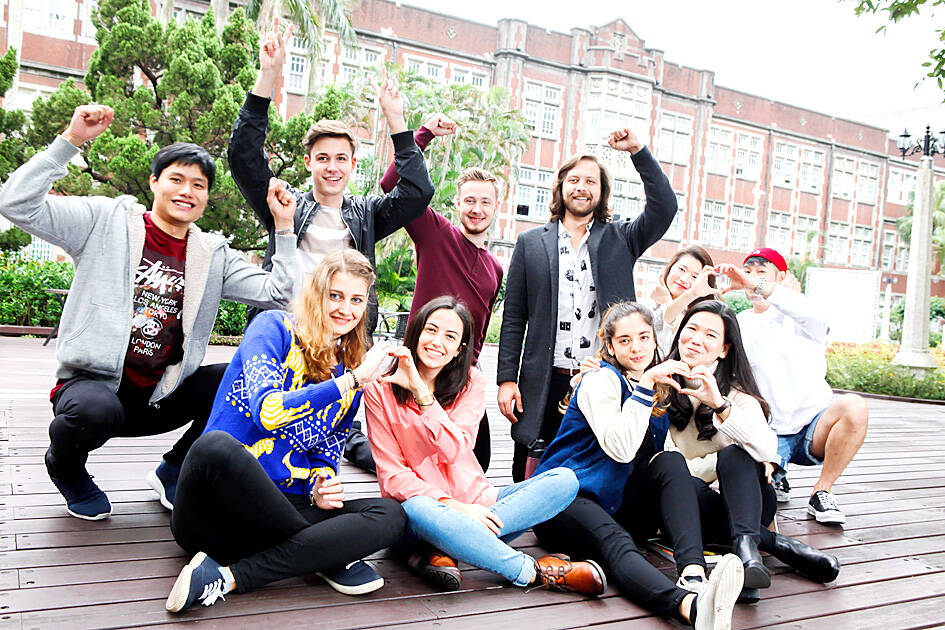The number of foreign students in the nation’s colleges and universities hit a five-year high last year, with National Taiwan Normal University (NTNU) topping the list with the most international students, Ministry of Education data showed.
Last year, 123,188 international students attended Taiwanese colleges and universities, 3,259 more than the previous academic year, the data showed.
NTNU had the most international students, with 7,648 students, followed by the National Taiwan University’s 6,249, it showed.

Photo courtesy of the National Taiwan Normal University
NTNU yesterday said that international students accounted for 12.05 percent of its degree students last year.
The percentage of overseas Chinese students at the university has also been the highest among universities in Taiwan for many years, increasing 6.65 percent last year compared with the previous year, it added.
NTNU president Wu Cheng-chih (吳正己) said the university’s success in attracting international students was due to careful planning and the implementation of three main strategies: bilingual education, a talent recruitment and retention strategy, and a campus internationalization strategy.
Facing the challenges of global competitiveness and a low domestic birthrate, the university has focused on promoting bilingual education, and since 2021 launched English as a medium of instruction (EMI) programs for undergraduate and graduate students, as well as increased the number of EMI courses and course capacities, he said.
NTNU now has six EMI undergraduate degree programs and 62 EMI postgraduate degree programs, with a total of 886 EMI courses available per year, Wu said, adding that it would continue to develop EMI courses.
The university attends international education fairs, produces student recruitment videos in multiple languages, pursues a global social media marketing campaign, and offers diversified programs and support for international students, he said.
More than 1,700 international students are enrolled at NTNU, he said, adding that the university assists them with employment counseling and internship recruitment in Taiwan.
Eighty-two international students who graduated between 2022 and last year stayed in Taiwan to work, he said.
To internationalize the campus and enhance administrative support and cultural integration, NTNU established an international students’ support office, offering comprehensive life and academic support to foreign students, he said.
The university also created specialized Mandarin language courses to help international students overcome the language barrier, Wu said, adding that NTNU had helped nearly 3,000 international students improve their Mandarin language skills since 2021.
The school plans to recruit one international administrative staff each year to help provide language and mental health support to foreign students, he said.
The construction of a specialized dormitory for Mandarin-language learners is to be completed in 2027, he said.
The university’s Academy of Preparatory Programs for Overseas Chinese Students is the only such program in Taiwan, and last year 76.5 percent of the students were from Myanmar and 8.66 percent from Indonesia, NTNU said.
Its Mandarin Training Center also had more than 5,000 international students from more than 90 countries last year.

Taiwan is stepping up plans to create self-sufficient supply chains for combat drones and increase foreign orders from the US to counter China’s numerical superiority, a defense official said on Saturday. Commenting on condition of anonymity, the official said the nation’s armed forces are in agreement with US Admiral Samuel Paparo’s assessment that Taiwan’s military must be prepared to turn the nation’s waters into a “hellscape” for the Chinese People’s Liberation Army (PLA). Paparo, the commander of the US Indo-Pacific Command, reiterated the concept during a Congressional hearing in Washington on Wednesday. He first coined the term in a security conference last

Prosecutors today declined to say who was questioned regarding alleged forgery on petitions to recall Democratic Progressive Party (DPP) legislators, after Chinese-language media earlier reported that members of the Chinese Nationalist Party (KMT) Youth League were brought in for questioning. The Ministry of Justice Investigation Bureau confirmed that two people had been questioned, but did not disclose any further information about the ongoing investigation. KMT Youth League members Lee Hsiao-liang (李孝亮) and Liu Szu-yin (劉思吟) — who are leading the effort to recall DPP caucus chief executive Rosalia Wu (吳思瑤) and Legislator Wu Pei-yi (吳沛憶) — both posted on Facebook saying: “I

The Ministry of Economic Affairs has fined Taobao NT$1.2 million (US$36,912) for advertisements that exceed its approved business scope, requiring the Chinese e-commerce platform to make corrections in the first half of this year or its license may be revoked. Lawmakers have called for stricter enforcement of Chinese e-commerce platforms and measures to prevent China from laundering its goods through Taiwan in response to US President Donald Trump’s heavy tariffs on China. The Legislative Yuan’s Finance Committee met today to discuss policies to prevent China from dumping goods in Taiwan, inviting government agencies to report. Democratic Progressive Party Legislator Kuo Kuo-wen (郭國文) said

Sung Chien-liang (宋建樑), who led efforts to recall Democratic Progressive Party (DPP) Legislator Lee Kun-cheng (李坤城), was released on bail of NT$80,000 today amid outcry over his decision to wear a Nazi armband to questioning the night before. Sung arrived at the New Taipei District Prosecutors’ Office for questioning in a recall petition forgery case last night wearing a red armband bearing a swastika, carrying a copy of Adolf Hitler’s Mein Kampf and giving a Nazi salute. Sung left the building at 1:15am without the armband and covering the book with his coat. Lee said today that this is a serious